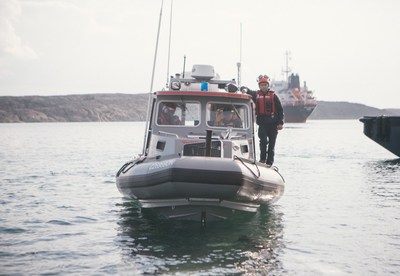SARNIA, ON, Sept. 24, 2018 /CNW/ - The Canadian Coast Guard's Inshore Rescue Boat (IRB) station in Rankin Inlet, Nunavut completed its first season of providing maritime search and rescue services on Tuesday, September 4, 2018.
The station opened in June 2018 as part of our government's Oceans Protection Plan, which is improving marine safety in Arctic waters, in collaboration with Indigenous communities.
This season, the IRB crew in Rankin Inlet completed training with the local Canadian Coast Guard Auxiliary unit to ensure that responses to search and rescue incidents are well-coordinated. By participating in a number of community events, the crew built strong partnerships within the community and promoted safe boating practices. Crew members spent over 103 hours on-the-water, and travelled 1,929 nautical miles, or 3,572 kilometres. They also responded to search and rescue cases, including an overdue vessel and subsequent search at Marble Island.
Through the IRB program, the Coast Guard employs post-secondary students to provide supplementary maritime search and rescue services during the busy summer season. In the North, the IRB program is operated by Indigenous students. Click here to apply for next year's crew, or visit jobs.gc.ca.
Marine emergencies can be called into the Joint Rescue Coordination Centre in Trenton 24 hours a day, 365 days a year, at 1-800-267-7270 or to a Canadian Coast Guard Marine Communications and Traffic Services Centre by VHF radio (channel 16) or by dialing *16 on a cell phone. For additional information on the Canadian Coast Guard's search and rescue services, please visit: http://www.ccg-gcc.gc.ca/sar/home
For more information about the Inshore Rescue Boat program please visit: http://www.ccg-gcc.gc.ca/SAR/IRB-Background.
Quick Facts
- In the regions where they operate, Inshore Rescue Boat crews are often the first to respond to distress calls from mariners, or to those in need of assistance, and are a vital part of the search and rescue system.
- The station in Rankin Inlet has improved marine search and rescue coverage for the area, and has reduced reliance on other resources such as the Canadian Armed Forces or Canadian Coast Guard icebreakers.
- Crew members acquire numerous skills and qualifications by participating in the IRB program, including boat handling, marine first aid, radio communications, search patterns, and training on Canada's national search and rescue system.
Associated Links
- Canadian Coast Guard – Search and Rescue
- Canadian Coast Guard Auxiliary
- Start Your Career With the Canadian Coast Guard
- Protecting our Coasts - Oceans Protection Plan
Stay Connected
- Follow the Department of Fisheries and Oceans Canada on Twitter, Facebook and YouTube.
- Follow the Canadian Coast Guard on Twitter, Facebook and YouTube.
- Subscribe to receive our news releases and more via RSS feeds. For more information or to subscribe, visit http://www.dfo-mpo.gc.ca/media/rss-eng.htm
SOURCE Canadian Coast Guard

Regional Communications Branch, Fisheries and Oceans Canada, Central and Arctic Region, 204-984-4715, [email protected]; Lauren Solski, Communications Advisor, Fisheries, Oceans and the Canadian Coast Guard, 519-383-1909, [email protected]


Share this article